Santa Sangre Blu-ray Movie
HomeSanta Sangre Blu-ray Movie 
Severin Films | 1989 | 123 min | Not rated | Jan 25, 2011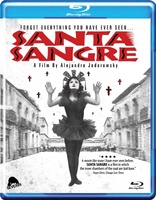
Movie rating
7.5 | / 10 |
Blu-ray rating
| Users | 3.5 | |
| Reviewer | 4.5 | |
| Overall | 4.0 |
Overview
Santa Sangre (1989)
A young man is confined in a mental hospital. Through a flashback we see that he was traumatized as a child, when he and his family were circus performers: he saw his father cut off the arms of his mother, a religious fanatic and leader of the heretical church of Santa Sangre ("Holy Blood"), and then commit suicide. Back in the present, he escapes and rejoins his surviving and armless mother. Against his will, he "becomes her arms" and the two undertake a grisly campaign of murder and revenge.
Starring: Axel Jodorowsky, Blanca Guerra, Sabrina Dennison, Adan Jodorowsky, Guy StockwellDirector: Alejandro Jodorowsky
| Horror | Uncertain |
| Drama | Uncertain |
| Mystery | Uncertain |
Specifications
Video
Video codec: MPEG-4 AVC
Video resolution: 1080p
Aspect ratio: 1.85:1
Original aspect ratio: 1.85:1
Audio
English: DTS-HD Master Audio 2.0 (48kHz, 24-bit)
Spanish: Dolby Digital 2.0 Mono (192 kbps)
Italian: Dolby Digital 2.0 Mono
Subtitles
English SDH
Discs
50GB Blu-ray Disc
Single disc (1 BD)
Packaging
Slipcover in original pressing
Playback
Region free
Review
Rating summary
| Movie | 4.5 | |
| Video | 4.0 | |
| Audio | 4.0 | |
| Extras | 4.0 | |
| Overall | 4.5 |
Santa Sangre Blu-ray Movie Review
Jodorowsky’s surrealist giallo, on home video in the U.S. for the first time.
Reviewed by Casey Broadwater January 27, 2011The word “visionary” gets tossed around a lot in essays about the cinema of Chilean director, cartoonist, erstwhile mime, shaman, and Tarot interpreter Alejandro Jodorowsky, and with good reason. His films often feel like actual visions, surrealist fever dreams populated by mentally and/or physically deformed freaks and characterized by an alchemical blending of sex and death, religion and perversion, spiritual enlightenment and brutal violence. He touts his movies as psychomagical shock treatments for an audience unknowingly in need of therapy, leading his characters to catharsis— and, by extension, us—through arcane imagery and symbolic acts. Some see this as pseudo-intellectual drivel—or, if completely overwhelmed, weirdness for the sake of weirdness—while others see the work of a singular artist, carrying the torch of cinematic antecedents like Buńuel and Fellini.
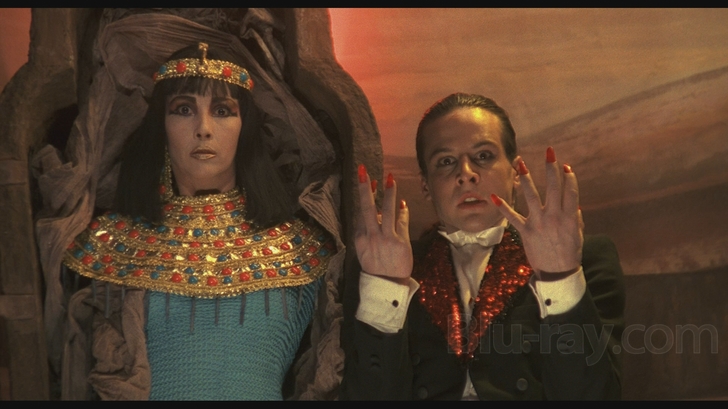
The inherent controversy speaks to the enigmatic power of Jodorowsky’s cult films—you can hate them or be entranced by them, but either way, they’re definitely worth discussing. And that, I think, is the mark of compelling art. Of the director’s best films—El Topo, Holy Mountain, and Santa Sangre—the last is arguably the most accessible and easy-to-read, but it’s still an undeniable oddity that plays like a Dario Argento version of Psycho as penned by magical realist Gabriel Garcia Marquez. If that sounds as amazing to you as it does to me, you’ll love Santa Sangre’s blood-spattered style and baroque storytelling.
We open in a mental asylum, where a naked, longhaired man (Axel Jodorowsky, the director’s son) perches in a tree that’s been rigged up in his concrete cell. The orderlies offer him a choice of meals—cooked steak and veggies or a raw fish. He takes the fish and eats it with gusto, guts and all. When he stands, we notice he has a giant bird tattooed on his chest. We cut to a close-up of a real falcon, which swoops down upon a small Mexican city, taking us back in time to the man’s childhood. His name is Fenix—appropriately enough—and he’s “The Boy Magician” in his family’s circus troupe. His ringleader father, Orgo, is a lecherous brute, while his pure-of-heart mother, Concha (Blanca Guerra), is a high-flying aerialist and the leader of a bizarre Catholic cult that worships a martyr/rape victim whose arms were severed during her murder. (Her santa sangre, or “holy blood,” is supposedly collected in a reservoir inside the cult’s church.) When Concha catches Orgo in bed with the Tattooed Woman (Thelma Tixou) and douses acid all over his crotch—ouch!—he responds by lopping off her arms, effectively turning her into her patron saint, before stumbling out into the night and slitting his own throat. The Tattooed Woman flees the scene with her mute/deaf protégé—Fenix’s best friend, Alma—and the young boy is left alone and traumatized.
The story proper picks up when adult Fenix spies his armless mother outside the asylum and escapes with her. Together, they start a cabaret act; she sings and dances and he stands close behind her, slipping his arms through her empty sleeves to essentially become her hands. The act continues at home, where he knits and plays the piano for her. In a strange way, they’ve become one. He is her physical puppeteer, and she exerts tremendous psychological force over his mind, to the extent that she forces him to murder a series of women that he lusts after—giallo style, with a super-sharp dagger—and then ritualistically bury them. The film quickly becomes a Freudian nightmare, as Jodorowsky explores symbolically the mind and motivations of a serial killer—the guilt, the obsession, and the three-way battle between the father (id), the mother (super ego), and the self (ego) that wages in Fenix’s mind. (Watching the film, I was reminded of the line from the trailer for Terrence Malick’s upcoming Tree of Life: “Father…mother…always you wrestle inside me. Always you will.”) As happens often in the films of David Lynch—with whom Jodorowsky shares many thematic affinities—peace ultimately comes in the form of a redeeming angel. Here, it’s Alma (Sabrina Dennison), whose stoic mime make-up can’t mask her healing, unconditional love.
With a rather conventionally structured, albeit completely nutso narrative, Santa Sangre is less esoterically complicated than Jodorowsky’s previous films—especially the acid western El Topo and the nebulous metaphysical freakout Holy Mountain—but it’s still dense with strange images and cryptic events. A funeral parade for a dead elephant turns into a gory free-for-all as starving citizens rip the noble beast in pieces. A greasy pimp saddles up to asylum inmates with Down’s Syndrome, urging them to snort cocaine and introducing them to a comically obese whore. A thin man tries to force feed a woman his prosthetic ear, a bodybuilding crossdresser takes all comers, and Fenix, in a hallucination, poses like Christ with his arms outstretched while assaulted by hundreds of frantically flapping chickens. In what is perhaps the film’s most unsettling scene, Fenix’s victims rise from their graves to torment him, their bodies painted stark white and naked but for gossamer wedding veils. Whatever your opinion, this is not a film you easily forget.
Like Fellini, Jodorowsky loves the intersection between the “high” pomp and ceremony of Catholic cultures and the “low” realities of street life. He mingles priests and prostitutes, letting the depraved coexist with the pious, asserting that the opposing forces of these kinds of dichotomies are really just two sides of the same coin—so to speak—that is life. Likewise, Santa Sangre is many things at once: a black comedy, a psychological drama, a profundo rosso horror movie—complete with spurting, Crayola-red blood—and a twisting tale of madness and redemption. At various times, you’ll be repulsed, elated, amused, empathetic, and maybe even turned on. Obviously, this isn’t for all tastes, but if yours run toward the dark and bizarre, Santa Sangre will likely slake your thirst.
Santa Sangre Blu-ray Movie, Video Quality 
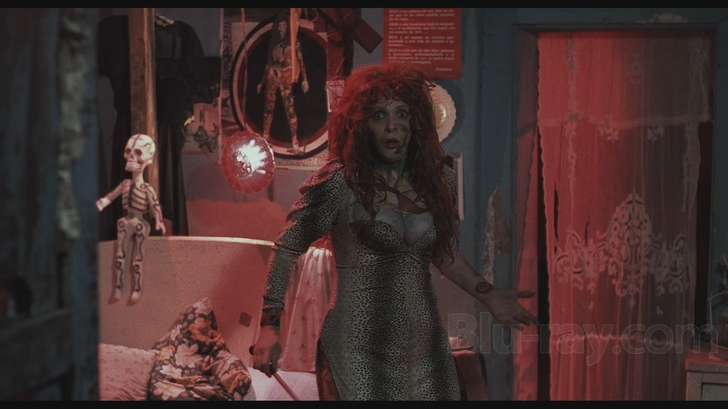
For its first time on home video in the U.S., Santa Sangre makes a satisfying showing, with a 1080p/AVC-encoded transfer that excels in detail and color reproduction. You'll notice straight away that careful attention has been paid to presenting a natural image. The film's 35mm grain structure is wholly intact, there's no evidence of DNR whatsoever, and although there are occasional traces of mild edge enhancement that can be noticed on certain hard outlines, you'd really have to go out of your way to look for it. I was also impressed by how clean the print is—I'm not sure what kind of restoration was undertaken on the film, if any, but there are practically no instances of visible dirt or debris here. Clarity is fully in keeping with the film's budget and time period—the picture may not always be tack sharp, but it looks true-to-source and has a rich, organic presence—and color is more than sufficiently dense, especially reds and other circus-y hues. Likewise, skin tones are accurate, black levels are plenty deep, and contrast is spot-on. There are a few times when highlights appear slightly blown out, but this is likely an exposure issue that's inherent in the film's negative. No biggie. There are really no distractions here at all—no excess compression noise, banding, blocking, aliasing, etc. This release has me excited to see what Holy Mountain would look like on Blu-ray.
Santa Sangre Blu-ray Movie, Audio Quality 
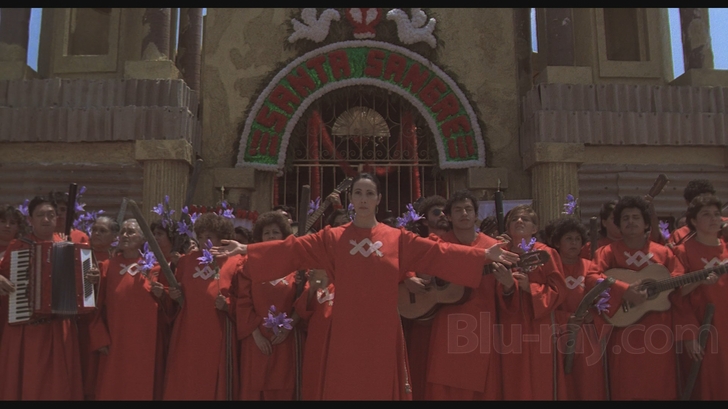
Rather than try to finagle a 5.1 mix out of the original stereo elements, Severin/MPI has wisely decided to present the film with a DTS-HD Master Audio 2.0 track. For the most part, it sounds wonderful. Dialogue is effortlessly clear and the balance is consistent—once you set a good listening level, you shouldn't have to touch your remote again. Simon Boswell's score carries plenty of dynamic heft and clarity, but some of the incidental pieces—like the various Mexican folk numbers—are a little shrill, with strings and horns that pierce a bit too harshly. No real complaints though. This is a listenable mix, with no hisses, dropouts, buzzes, or muffling. Do note that the disc only includes one subtitle option, and English SDH track that appears in large, easy- to-read white lettering.
Santa Sangre Blu-ray Movie, Special Features and Extras 
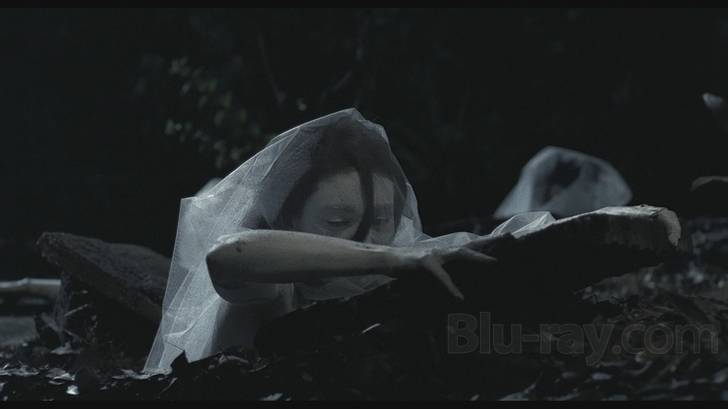
MPI/Severin Films has put together a truly impressive array of bonus materials for this release, including an audio commentary, a feature-length retrospective documentary, several interviews, a Q&A, and more. There's some overlap in the information you'll garner from these supplements, but they're all worth watching. Note that while the bonus materials are all technically presented in 1080p/i, it's clear that they've been upscaled from a standard definition source.
- Audio Commentary: Jodorowsky is joined by journalist Alan Jones—that's perhaps the most "Js" I've ever used in a sentence—for an insightful, comprehensive commentary track newly recorded for this release of the film.
- Forget Everything You've Seen: The World of Santa Sangre (1080p, 1:36:38): A terrific seven-part documentary that examines the film from all angles, from its origins and production to its characters and symbolism. Features extensive interviews with Jodorowsky, various crew members, and several of the film's actors. A must-watch.
- For One Week Only: Alejandro Jodorowsky (1080i, 32:32): This British television show from 1991, an overview of Jodorowsky's career, is hosted by Jonathan Ross, who interviews the director and several of his collaborators and high-profile fans, including Omar Sharif and Dennis Hopper.
- Goyo Cardenas Spree Killer (1080p, 17:40): A featurette about the real-life serial killer who inspired Jodorowsky to make the film.
- On Stage Q&A with Jodorowsky (1080p, 24:37): A Q&A recorded after a screening of the film in London in 2002.
- Jodorowsky 2003 Interview (1080i, 31:19): Here, Jodorowsky discusses his early influences, his studies, the Hollywood filmmaking system, financing, etc.
- Composer Simon Boswell Interviews Jodorowsky (1080p, 7:57): Another shorter interview, in which Jodorowsky talks about comics, the Tarot deck, etc.
- Blink Jodorowsky Short by Simon Boswell (1080p, 2:02): Two minutes of Jodorowsky blinking very slowly. No, really.
- "Close Your Eyes" Music Video by Simon Boswell (1080p, 5:47): A tie-in music video utilizing clips from the film.
- Echeck - Adan Jodorowsky Short Film (1080p, 3:56): A silent black and white short by Jodorowsky's son, featuring a woman licking an enormous lollipop under the Eiffel Tower, which is about to be pushed over by an angry mob.
- Deleted Scenes (1080p, 7:35): A few short deleted scenes, with commentary by Jodorowsky.
- Theatrical Trailer (1080p, 2:00)
- Japanese Trailer (1080p, 2:54)
- Severin Trailers (1080i): Includes trailers for Gwendoline, Hairdresser's Husband, Hardware, Immoral Women, In the Folds of the Flesh, Psychomania, What?
Santa Sangre Blu-ray Movie, Overall Score and Recommendation 

What a pleasure it is for Jodorowsky fans in the U.S. to finally get their hands on Santa Sangre in a legitimate, non-bootlegged form. Better yet, it's on Blu-ray, where the film certainly looks better than ever. With a solid A/V presentation and five hours of bonus features, this release has definitely been worth the wait. If you're new to the Chilean mystic filmmaker, I'd track down a trailer for the movie online first—Santa Sangre probably isn't blind-buy material—but cult classic cinephiles should already have their credit cards at the ready.
Similar titles
Similar titles you might also like

The Eyes of My Mother
2016

They Look Like People
Slipcover in Original Pressing
2015

Clown
2014

The Boy
2015

Daniel Isn't Real
Slipcover in Original Pressing
2019

Nightmare
Nightmares in a Damaged Brain | 4K Restoration
1981

The Fear
1995

Poison for the Fairies
Veneno para las hadas / The Evil Fairies
1986

The Little Stranger
2018

Marrowbone
The Secret of Marrowbone
2017

Summer of 84
2018

A Field in England
2013

I Trapped the Devil
2019

The Cannibal Man
The Apartment on the 13th Floor / La semana del asesino
1972

Mr. Sardonicus
1961

#Horror
2015

The Harvest
2013

The Bad Seed
1956

The Stepfather 4K
Collector's Edition
1987

Martyrs
2015

